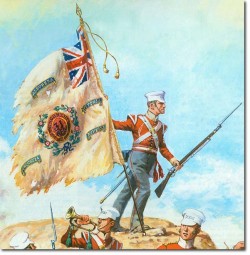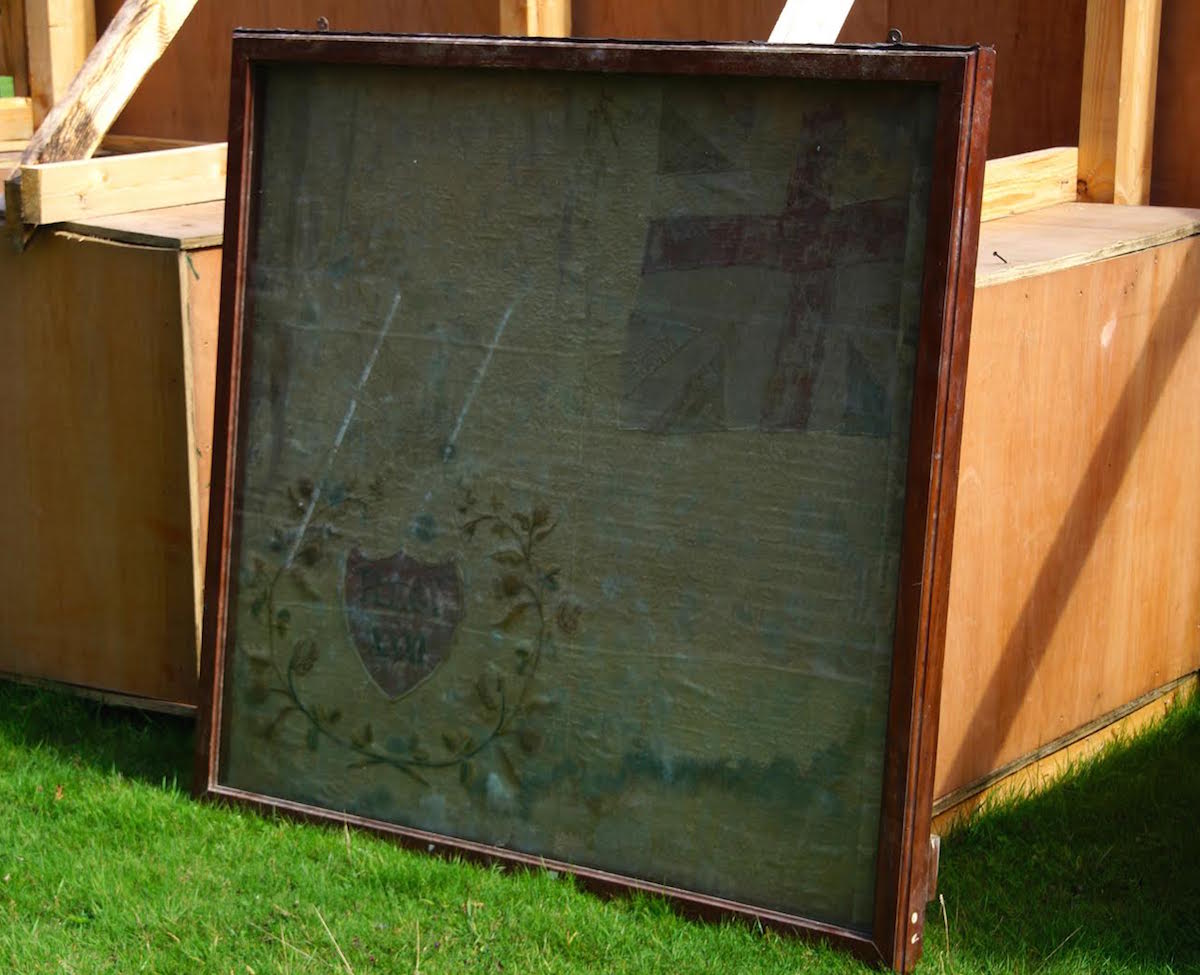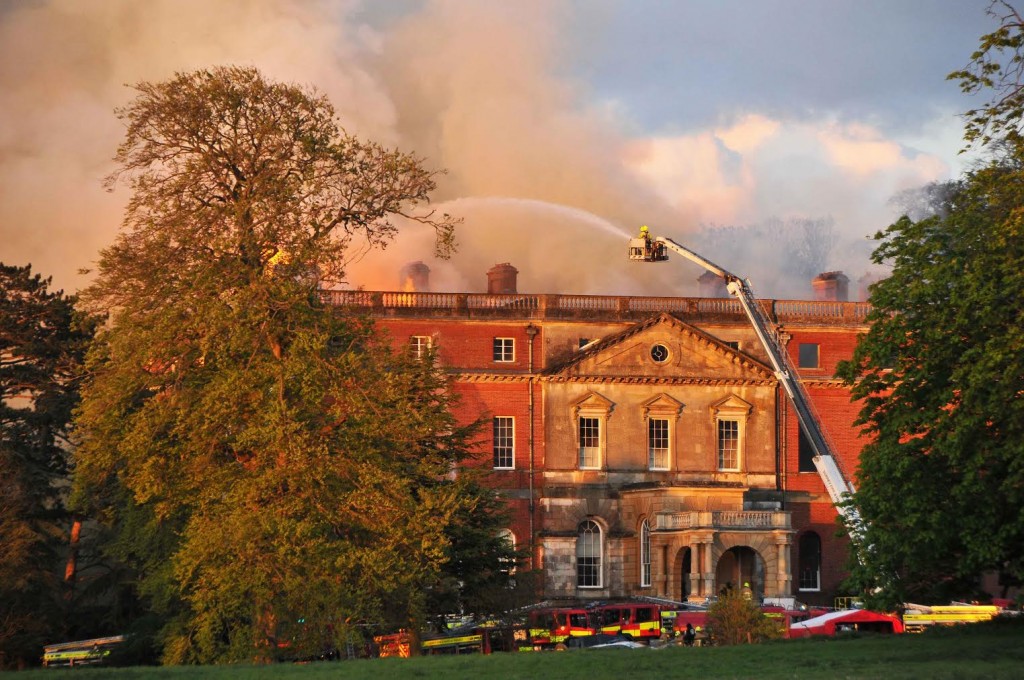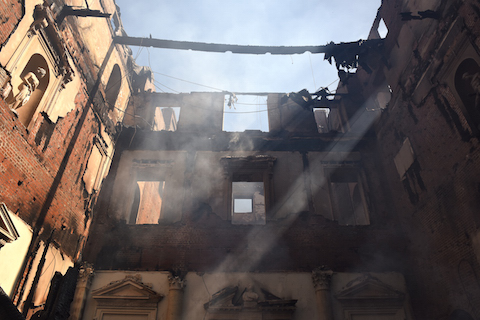 Abraham Lincoln
If given the truth, the people can be depended upon to meet any national crisis...
Abraham Lincoln
If given the truth, the people can be depended upon to meet any national crisis...
 Guildford news...
for Guildford people, brought to you by Guildford reporters - Guildford's own news service
Guildford news...
for Guildford people, brought to you by Guildford reporters - Guildford's own news service
Three More Regimental Colours Rescued From Burnt Out Clandon House
Published on: 15 Sep, 2015
Updated on: 15 Sep, 2015
Three more regimental colours from forbear regiments of today’s Princess of Wales’s Royal Regiment (PWRR, nicknamed “The Tigers”), the local regiment for South East England, have been retrieved from the burnt out shell of Clandon House.

A water colour of Sgt McCabe with the Regimental Colour (not thought to be the one rescued) of the 31st of Foot on the Sikh ramparts at Sabraon in 1846.
In army infantry regiments, colours are flags that traditionally were rallying points for soldiers in battle; they bear a regiment’s battle honours. Seen to represent the regiment’s history and honour, they are much revered.
Until a few weeks ago, very little had been recovered from the disastrous fire at Clandon Park that destroyed the Surrey Infantry Museum in April this year.
In August contractors responsible for the site, gained access to the undercroft beneath the central range of the house. The undercroft is supported by vaulted stonework so ceilings did not collapse and the rooms within, apart from water damage, are intact.
A statement from PWRR said: “In one of the rooms, known as Tom Tit’s Stables, the contractors Erith Construction found three colours still in their frames screwed to the walls. Working with the contractors, the National Trust and the museum’s restoration company Farcroft, made arrangements to remove them.
“On Friday, August 21 a combined team from Erith and Farcroft entered the undercroft, removed the smallest of the colours from the wall and manoeuvred it out into the daylight. It was the colour of the 1st Battalion Huntingdon Regiment (31st of Foot, one of the forebears of the East Surrey Regiment). It dates from 1788 and bears some water and mould damage but should be restorable.

The rescued regimental colour of the 31st of Foot, just before it was taken to specialist restorers in the Midlands.
“The colour was immediately taken off to Farcroft’s workshops in he Midlands. Later that night the process of stabilisation and restoration began: after only a few days of initial treatment the results are impressive.
“The two remaining framed colours are too large and will not fit through the window: rather than risk damage by taking them out of their frames, they will be treated on site to restrict further mould growth and re-located to a drier and better-ventilated room on the west side of the undercroft, until they can be safely removed.
“After suffering the ravages of battle, fire and two-hundred years of history, another few weeks should do no harm.”
The unexpected find has raised hopes that when the full archaeologically-led salvage operation begins, probably in the next four weeks, there might be much more lying under the rubble waiting to be unearthed.
A significant number of medals were extricated on the night of the blaze, the Fire & Rescue Service dramatically rescued four colours of PWRR forebear regiments from the burning building just before the floors collapsed.
On the day after the fire, Clandon House stood as a burnt-out shell with very little internal structure left undamaged. The south range, which housed the museum in the basement and its reserve collection in the attics, was completely gutted. The heat had been so intense there was serious concern that the retaining walls had been deformed to the point where the entire building was in danger of collapse.
Four months after the fire, Clandon House, surrounded by high, green perimeter fencing, has survived and is eerily peaceful. Two tall cranes, working since July to remove the tangle of huge wooden beams, girders, loose brickwork and cabling littering the interior, stand beside the west front.
A small village of portable buildings, polytunnels and shipping containers has sprung up in the paddock on the far side of the ha-ha: from there the salvage phase of the operation will be directed, once the remaining heavy debris has been removed and all areas of the interior are safe to enter.
Responses to Three More Regimental Colours Rescued From Burnt Out Clandon House
Leave a Comment Cancel reply
Please see our comments policy. All comments are moderated and may take time to appear. Full names, or at least initial and surname, must be given.
Click on cartoon for Dragon story: Public Asked for Views on SCC’s Proposal for Reduced Speed Limits


Recent Articles
- Wildlife Group Invites Nature Lovers To Spot and Record Threatened Species
- Esme Campbell, Taking the Mantle of the Dragon’s Newest Reporter
- Witness Appeal Following Serious Assault in Guildford
- Notice: Can You Help the University of Surrey Research Elderly Falls?
- Opinion: Waverley Has Failed Spectacularly on CIL
- Highways Bulletin: Smarter Planning for Better Bus Journeys in Surrey
- Letter: Will GBC’s New Planning Document on Building Heights Be Effective?
- Proposed New Leisure Contract Should Improve Facilities and the Council’s Income
- Witness Appeal Following Fatal Collision
- Celebration at Guildford Cathedral of Its Latest and Future Church Leaders


Recent Comments
- George Potter on Letter: A Simple Footbridge Should Have Been Affordable to Keep Towpath Over Weir Open
- John Redpath on Proposed New Leisure Contract Should Improve Facilities and the Council’s Income
- Jan Messinger on Public Asked for Views on SCC’s Proposal for Reduced Speed Limits
- Fiona White on GBC Asks Residents for Views on Its Draft Building Height Guidance
- Dave Middleton on Letter: Fine Those Guilty of Anti Social Behaviour
- Carina Coverly on GBC Asks Residents for Views on Its Draft Building Height Guidance
Search in Site
Media Gallery
Dragon Interview: Local Artist Leaves Her Mark At One of England’s Most Historic Buildings
January 21, 2023 / No Comment / Read MoreDragon Interview: Lib Dem Planning Chair: ‘Current Policy Doesn’t Work for Local People’
January 19, 2023 / No Comment / Read MoreA3 Tunnel in Guildford ‘Necessary’ for New Homes, Says Guildford’s MP
January 10, 2023 / No Comment / Read More‘Madness’ for London Road Scheme to Go Ahead Against ‘Huge Opposition’, Says SCC Leader
January 6, 2023 / No Comment / Read MoreCouncillor’s Son Starts Campaign for More Consultation on North Street Plan
December 30, 2022 / No Comment / Read MoreCounty Council Climbs Down Over London Road Works – Further ‘Engagement’ Period Announced
December 14, 2022 / No Comment / Read MoreDragon Interview: GBC Reaction to the Government’s Expected Decision to Relax Housing Targets
December 7, 2022 / No Comment / Read MoreHow Can Our Town Centre Businesses Recover? Watch the Shop Front Debate
May 18, 2020 / No Comment / Read More








Carol Brown
September 15, 2015 at 11:45 am
The news about the colours is amazing. It has brightened up what, so far, as been a horrible day.
Martin Elliott
September 15, 2015 at 2:26 pm
Yes its good news that the emergency response plan worked so well to rescue artifacts. Also by plan or design some more were protected by debris.
However it’s clear that whatever fire protection, detection and suppression measures were in place they were not suitable or sufficient.
Even now, four months after the fire, there has been no news from the fire investigation on what caused the fire (in an occupied building) or how it was able to spread so rapidly and extensively.
Devastating fires are occurring far to often and I don’t feel celebrating the reconstruction of a replica (repair/restoration) is a proper response from National Trust.
The rescued regimental colour is not a replica, it is an original that has been laid up, as all colours are once they have aged or regimental organisation changes causing their replacement. The press release came from the Princess of Wales’s Royal Regiment not the National Trust. Ed
Denis Gorman
March 31, 2016 at 8:09 am
I am looking for photo of flag of 10th Battalion East Surrey Regiment from World War One. Can anyone please help? I am doing my family history of relations who served. Many thanks.
Please reply by comment.